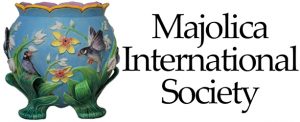A presentation given to the National Academy of Design
January 16, 2004
by Marilyn G. Karmason, M.D.
Click on pictures to enlarge!
Updated: June 30, 2009
Section 2: More on Minton
Now the Gothic revival and medieval styles. Minton’s Tower Jug, in the shape of a medieval castle, had men & women dancing between twisted ivy vines.
A Tavern jug modeled in high relief (1873) show two carousing couples and a besotted observer.
Naturalism and Palissy marine styles are also on Victorian dinner tables. Here are nine Minton oyster plates and here is a familiar.
Four-tiered oyster plate.
A surprise comes with this Minton five tiered 31 shell oyster stand. These extremely Aquatic menus call for
A fish tureen
A lobster platter,
A lobster box
And a crab box.
Now a famous pigeon pie, the tureen resting on 3 gray fantailed pigeons, with a finial of a white pigeon.
Minton’s game pie dish has a hunting dog with his master’s hunting horn and gun and the rabbit runs away.
Two hares’ heads keep looking for another game pie dish, but the hares overlook the birds between them.
Here isa most beautiful Minton pitcher: we’ve never known anyone who saw it until it was in our majolica auction in March. At last bid, a collector called out “$50,000!” to everyone’s surprise — and it won the day.
Other examples include: Asparagus cradles.
Chestnut bowls for hot or cold chestnuts.
The Stilton Cheese Bell in beehive shape is greatly valued because of size and design.
And a strawberry server that has a large spoon for the berries and small spoons for sugar and cream
Now teapots. The “Cat and Mouse” and the fish teapots are very special, and there are 6 other special Minton teapots: the monkey, Chinese man, turtle (to our left), cockerel and monkey, lemon, and secretary bird and serpent.
And here is a Chinese tea server.
We have seen two rare ice stands. The ice on top filters down & keeps desserts cool.
The second has led to argument, some wishing to designate the water filters as an oyster stand. I find them both to work well and consider them both ice stands.
Outdoor naturalistic pieces of majolica were made for the conservatory or garden. The 41” high Stork and Heron walking stick stands can hold flowers or umbrellas.
Larger than the stick stand is the magnificent 5’2” Peacock by Paul Comolera, sold at a Majolica auction for 165,000 British Pounds.
Large garden seats, such as this passion flower design, are truly beautiful and comfortable.
Flowers look wonderful in a Triple Horn.
Or a Forest Fawn.
Other examples are of Oriental and Islamic style. Here’s a blue-and-white flowered garden seat designed by the botanist, Dr. Christopher Dresser. The garden seat is decorated with arabesques and openwork.
A very rare Chinese chair is in the updated book: Thanks to an ex-president of the Majolica Society, Gerald Leberfeld, that chair itself is now in a foyer in New York City. Joan Jones, who was the Minton curator, thinks that it may be the only majolica chair!
There’s also a Chinese garden seat we hadn’t seen before.
And an Oriental tea service that a collector can take to her garden.
Lastly, Minton Figural pieces: Eighteenth-century models with wicker baskets, carry clothes, food and wine.
A 25” Victorian wine cooler of 1851 portrays a young couple and their dogs. Up above, the Bacchanites guard the wine cask.
These dramatic figural pieces at the 1867 Paris exhibition were 6’ tall majolica Blackamoor heads balancing flower baskets. Pearls at her throat, lion pelts over his head, each figure is mounted on square pedestals decorated with satyrs. We have seen the same Blackamoor figures with candelabras attached to their heads.
Here is a rarely seen and beautiful French Horse auctioned by Sotheby in London.
Here is a special addendum, rarely in majolica books — the Royal Dairy at Frogmore, on the grounds of Windsor Castle. Note the figurals and tiles, and forty bowls to guard milk and cream for Queen Victoria & her family.
The ceramic water fountain of Aphrodite and her Heron cools the Royal Dairy.
A statuette adds to the elegance of the 7% of the milk and cream was needed by the family; the rest was sold. Majolica society members visited the Royal Dairy some years ago and the members saw themselves back in the Victorian era!




































